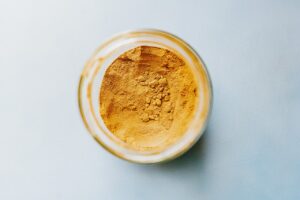The vibrant, golden spice that is turmeric has extensively been used as a culinary ingredient, especially in Indian curry powder. Recently, the alternative and complementary medicine community has started to reveal its diverse health benefits. But what are the specific health benefits of turmeric? Let’s get to know more about this powerful herb from the perspective of both traditional Ayurvedic medicine and modern scientific research from various medical journals.
Understanding the Active Components of Turmeric
The active ingredient in turmeric, known as curcumin, is a potent anti-inflammatory and antioxidant compound. When taken as turmeric supplements or in its raw form as turmeric root, it delivers a host of potential health benefits. The richness of curcumin in turmeric powder or turmeric extract, however, can depend on various factors like growing conditions, processing, and storage.
Impressive Health Benefits of Turmeric

1. Anti-Inflammatory Powerhouse
Chronic inflammation is closely linked to several serious health conditions, including heart disease, cancer, metabolic brain disease, and Alzheimer’s disease. The anti-inflammatory properties of curcumin supplements match the effectiveness of some anti-inflammatory drugs. By reducing inflammation, curcumin can help manage inflammatory bowel disease and active rheumatoid arthritis, demonstrating why it is favored in integrative health.
2. Potent Antioxidant
Curcumin’s antioxidant properties are powerful enough to neutralize harmful free radicals, thus protecting the body against diseases. Furthermore, according to food research studies, it boosts the body’s antioxidant enzymes, reinforcing overall health.
3. Brain-Health Booster
Curcumin enhances neurogenesis and boosts levels of the brain-derived neurotrophic factor (BDNF). Decreased BDNF levels are linked to common brain disorders including depression and Alzheimer’s disease. Incorporating turmeric supplements could, therefore, boost brain function and potentially delay the onset of these disorders.
4. Heart Disease Prevention
Curcumin has been shown to benefit heart health by improving vascular endothelial function, reducing the risk of acute myocardial infarction, and even post-operative complications following coronary artery bypass grafting. These findings make it essential in a dietary regime for cardiovascular disease prevention.
5. Cancer Prevention and Treatment
The anticancer properties of turmeric and curcumin arise from their ability to induce apoptosis in cancerous cells and inhibit tumor cell growth. While many types of cancer still require traditional treatment, animal studies have highlighted the beneficial role of turmeric extracts in mitigating the potential for cancer to develop or progress.
6. Arthritis and Joint Pain Relief
Arthritis involves joint inflammation, so it’s not surprising that the anti-inflammatory properties of curcumin supplements can help in managing active rheumatoid arthritis and knee osteoarthritis. The power of this golden spice surpasses some anti-inflammatory drugs, offering natural pain relief.
7. Battle Against Depression
Curcumin shows promise as a treatment for major depressive disorder. It can potentially boost BDNF levels, thereby reversing the changes induced by this condition. Although more research is needed, early results are promising.
Turmeric: A Gem in the World of Alternative Medicine

The prominence of turmeric in alternative medicine is well recognized. It has been used for centuries in Ayurveda, an ancient Indian healing practice. Today, its multitude of benefits are becoming widely acknowledged within complementary and integrative health practices. Its touted benefits range from supporting cardiovascular health to neurological function, and securing a trustworthy position in the world of natural, plant-based remedies.
Scrutinizing Health Claims
Despite the promising research, it’s important to carefully consider the various health claims about turmeric and curcumin. While many have been explored in scientific research, a comprehensive understanding is necessary to fully evaluate and back these claims.
This is particularly true when looking at early research results. Many suggest that curcumin can reduce inflammation in conditions like active rheumatoid arthritis and Irritable Bowel Syndrome (IBS). These findings certainly shine a positive light on the broad health benefits associated with turmeric and its core active compound.
However, it’s important to note that concrete health claims often rely on further evaluation. This typically entails rigorous scientific analysis, including but not limited to randomized controlled trials. Only in this way can the promising results be adequately scrutinized and, if found substantial, adopted into wider medical and health practices.
Incorporating Turmeric into Your Lifestyle

To reap the health benefits of turmeric, it’s essential to know how to incorporate it efficiently. While adding turmeric powder to your food may not provide the desired effects, as curcumin does not metabolize effectively in the body, pairing turmeric with black pepper can enhance curcumin’s absorption. Piperine, a compound found in black pepper, can boost curcumin’s bioavailability by up to 2000%. Using turmeric as a dietary supplement, such as curcumin supplements or turmeric tea, can also effectively yield advantages. A randomized controlled trial showed the benefits were seen even when participants consumed curcumin with olive oil.
Know the Potential Side Effects
Despite its astounding benefits, excessive intake of turmeric might lead to digestive disorders and skin disorders, among other issues. It’s important to consult a healthcare professional before starting any supplement routine, to ensure it’s right for you.
Potential Role of Turmeric in Pharmacological Research
The broad benefits of turmeric and curcumin pave the way for their potential in pharmacological research. Their anti-inflammatory, antioxidant, and potential anticancer properties make them ideal candidates for drug development research. Research continues every day to understand and unleash the full potential this golden spice possesses. This alone puts turmeric at the forefront of groundbreaking research in pharmaceutical studies.
As research continues, the importance of turmeric and curcumin in both alternative and mainstream medicine becomes even more apparent. From managing inflammation, digestive health, and mental well-being to potentially fighting against severe diseases, the health benefits of turmeric are truly wide-ranging.
Putting It All Together: What Are the Specific Health Benefits of Turmeric
From its pervasive use in traditional medicine to its widespread acceptance in complementary medicine, the health benefits of turmeric are expansive. Whether you’re looking to mitigate chronic diseases or seeking general health, turmeric has earned a well-deserved spot on the countertop.
Keep in mind that while the benefits of turmeric are highly promising, it should be seen as part of a holistic health regime and not as a complete solution to health conditions. Always remember, preventive health starts with a balanced diet, regular exercise, and an integration of natural herbs and spices like turmeric. Stay healthy and glowing with this golden spice!

